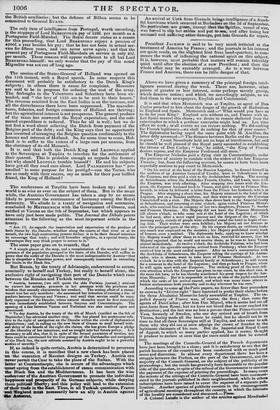The conferences at Tceplitz have been broken up; and the
world is as wise as ever on the subject of them. But in the mean while, the Austrian Government has taken a step by no means likely to promote the continuance of harmony among the Royal fraternity. We allude to a treaty of navigation and commerce, concluded by Menai:telex with the Government of Greece, and ratified at Vienna on the 9th of September, but which appears to have only just been made public. The Journal des Debuts points attention to the following as the most important article in the treaty.
" Art. 17. As regards the importation and exportation of the produce of both States by the Danube, whether along the course of that river or at its mouth, the two high contracting powers declare it to be their formal intention to encourage that trade ; and will hereafter stipulate, in a special treaty, the advantages they may think proper to secure to it."
The same paper goes on to remark, that
" A simple glance at the map, and a recapitulation of the number and im- portance of the population grouped in the basin of the Danube, will suffice to prove that the outlet of the Danube is the most indispensable for Austria—that she is altogether a Danubian power, and consequently interested in extending her limits to the Black Sea."
But Russia, by the treaty of Adrianople, endeavoured to secure, nominally to herself and Turkey, but really to herself alone, the exclusive right of navigating that part of the Danube which runs between the Russian and Turkish territory.
" Austria, however, (we still quote the able Parisian journal,) anxious to correct her mistake, proceeds in her attempts with the prudence and wisdom that ususally characterize her conduct. The setting afloat of a steam. vessel was her only manifesto: she announced her intention of running a line of packets between Smyrna and Vienna ; and until that service could be regu- larly organized on the Danube, where natural obstacles must be first removed, it was immediately established between Smyrna and Constantinople. The opening of a line between Vienna and Trebisond was also resolved upon and announced.
" To- day Austria, by the treaty of the 4th of March (ratified on the 9th of September) has advanced another step. She has placed her pretensions rela- tive to the right of navigation on the Danube within the circle of diplomatical stipulations; and, in calling on the new State of Greece to avail herself with- eat delay of the benefit of the right she claims, she has given Europe a pledge of the liberality of her intentions, and an insight into her future policy. Is it necessary to add also, that if, in spite of the formal guarantee of treaties, any fears could be entertained for the free passage of the Dardanelles and navigation of the Black Sea, the new attitude assumed by Austria ought to be a powerful motive of security."
If, as indeed is quite certain, Austria is determined to persevere in this course, it is manifest that a new check has been placed -0DT1 the execution of Russian designs on Turkey. Austria can .never permit the Czar to take the place of' the Sultan. With the latter at Constantinople, she is secure of the advantages which 'must spring from the establishment of steam communication with the Black Sea and the Mediterranean. It has been the wise endeavour of the Austrian Government to promote the individual happiness aid prosperity of its German subjects, while denying them political liberty; and this policy will lead to the extension of their• trade in the East. Thus, in all Turkish questions, France 'auditestand mist necessarily have an ally in Austria against
Wit.
An arrival at Cork from Grenada brings intelligence of a dread- ful hurricane which occurred at Barbadees on the 3d of September. No particulars are given, except that thefipitfire, vessel of war, was forced to slip her cables and put bait, and after losing her mainsail and suffering other damage, put into Grenada for repair.


























 Previous page
Previous page